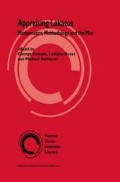Abstract
Imre Lakatos’ philosophy of science is rooted in a number of different fields, not all of them purely scientific. During his years of education, he was influenced by mathematics and natural sciences as well as by philosophy, but the role of political ideologies also cannot be denied. His basic philosophical ideas — such as the rationality of science, the continual growth of knowledge, the social determinism of scientific activities, and the indispensable role of historical attitudes in the philosophy of science — are definitely in accordance with his early devotion to Marxism (and Lukátcs’ philosophy), both in theory and in practice.
Access this chapter
Tax calculation will be finalised at checkout
Purchases are for personal use only
Preview
Unable to display preview. Download preview PDF.
Notes
“A tudományos életünk reformja”, Forum 1946/4 (December), pp. 285–293. This was the introductory essay of that number, and it was motivated by Lukács.
Note that in the paper “Modern Physics, Modern Society,” Lakatos writes that “human nature is changed primarily not by…” (italics in the original).
That is, the candidate received the best possible grade in every subject.
As a rule, every philosophy student had to choose aesthetics and pedagogy as secondary subjects for the doctoral examination. Otto Varga, however, filed a petition with the Faculty (on the 30th of May, 1947) that Lakatos be allowed to take mathematics and physics, because “the subject of his dissertation belongs to natural philosophy, which is a border field between physics and mathematics.”
As we know, the full title was “On the sociology of scientific concept building” [In Hungarian: A terrnészettudomanyos fogalomalkotas szociológiajahoz.
Ottó Varga.
sub laurea Almae Mauls: it means that both the exam and the dissertation were summa cum laude.
Athenaeum: Philosophical journal of the Hungarian Philosophical Society and the Hungarian Academy of Sciences.
The full title is “Criticism of physical idealism” [A fzzikai idealizmus bíralata].
[Tovabbképzés és demokrácia]This volume consisted of a collection of scientific and philosophical papers written for schoolteachers.
Modern fzzika—modern tarsadalom].
“Reality”: A journal for social sciences.
Molnar Erik: Dialektika and Citoyen és munkasosztaly].
A vilagos pillanat] Imre Csécsey was the president of the Hungarian Radical Party.
“Twentieth Century”: An old journal for social sciences.
This is a mistake: Imre Csécsey was never an editor of Forum.
[Edtviis kollégium— Györffy kollégium]These colleges represented two very different kinds of educational institutes in Hungary. The Eötvös College was (and is) an exclusive and elitist educational institute, while Györffy College presented a high quality popular education. Lakatos suggested that Eötvös College be transformed following the model of Györffy College, because Hungary needed a new kind of popular elite.
The English titles of these journals are: “Reality,” “Fifteenth of March,” “Reply,” “Free People,” “Tisza-country” “Common Education,” “Human Education.”
“Human Education”: A pedagogical journal.
[Demokratikus nevelés és természettudomanyos vilagnézet].
By the “modern” form of Marxism, Karácsony probably means Lukács’ philosophy.
Author information
Authors and Affiliations
Editor information
Editors and Affiliations
Rights and permissions
Copyright information
© 2002 Springer Science+Business Media Dordrecht
About this chapter
Cite this chapter
Kampis, G., Kvasz, L., Stöltzner, M. (2002). A Documentation Arranged by Gábor Kutrovátz. In: Kampis, G., Kvasz, L., Stöltzner, M. (eds) Appraising Lakatos. Vienna Circle Institute Library, vol 1. Springer, Dordrecht. https://doi.org/10.1007/978-94-017-0769-5_18
Download citation
DOI: https://doi.org/10.1007/978-94-017-0769-5_18
Publisher Name: Springer, Dordrecht
Print ISBN: 978-90-481-5922-2
Online ISBN: 978-94-017-0769-5
eBook Packages: Springer Book Archive

